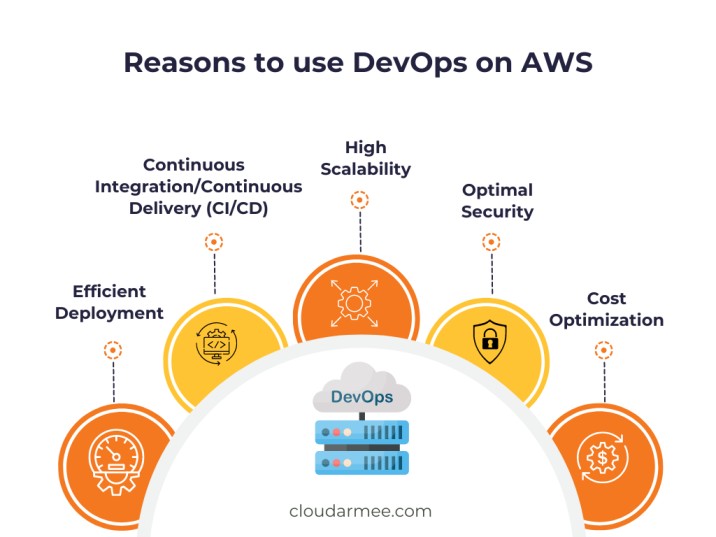Implementing DevOps on AWS is a significant undertaking. AWS actively supports DevOps processes by offering application building, storage, and deployment services, focusing on key features like continuous integration and delivery.
AWS provides various tools to aid DevOps practices, including CodeDeploy, CodePipeline, CodeCommit, and the essential monitoring tool, Amazon CloudWatch. It is advisable for most organizations to initiate a proof-of-concept implementation of the DevOps model and associated technologies, showcasing seamless integration with existing development, testing, deployment, and operational processes. Assessing the suitability of AWS DevOps solutions for organizations, particularly those with applications in the public cloud, is crucial for IT teams.
The effective adoption of DevOps brings forth numerous efficiency-related benefits for businesses. Understanding the optimal approaches is essential if your organization utilizes AWS and wants to leverage DevOps practices.
AWS DevOps represents the amalgamation of cultural philosophies, practices, and tools designed to enhance an organization’s capacity to deliver applications and services swiftly and efficiently on Amazon’s cloud platform.
AWS excels in providing DevOps professionals with various tools essential for building a rapid, scalable, and secure environment. As a trailblazer in cloud computing, Amazon furnishes fully programmable services that boast easy configurability and accessibility through a robust CLI.
Amazon’s services are inherently designed for seamless scalability, with every service readily available from the outset. This streamlined process is facilitated by numerous automation tools offered by AWS, including AWS CloudFormation and the continually updated Terraform provider. These services are pivotal in assisting AWS DevOps engineers in swiftly creating and managing CI/CD, load balancers, Identity and Access Management (IAM), and more.

Planning and Development: Developers plan, create the application codebase, and define requirements, aligning with the necessary infrastructure. This marks the initial step in implementing DevOps on AWS.
Continuous Integration: Developers continually integrate code into a shared repository. Tools like AWS CodePipeline and AWS CodeBuild automate the build and testing of code changes, ensuring high-quality, bug-free code and early detection of integration issues.
Continuous Delivery: Automation is leveraged to build, test, and deploy the application to the production environment. AWS tools like CodePipeline and CodeDeploy facilitate the automatic deployment of code changes to production, reducing the time to deliver new features and bug fixes to end-users.
Monitoring and Feedback: Operations teams monitor the application’s performance and provide feedback to the development team. Tools like Amazon CloudWatch and AWS X-Ray are invaluable in tracking application and infrastructure performance, allowing teams to identify and address issues proactively.
Continuous Improvement: The development team iteratively enhances the application based on feedback received from the operations team. AWS offers a suite of DevOps tools, including AWS CodeCommit, AWS CodePipeline, AWS CodeBuild, and AWS CodeDeploy, streamlining the various stages of the DevOps process. These tools automate processes, resulting in a faster, more reliable, and more efficient development lifecycle.
Infrastructure as Code (IaC): AWS, in conjunction with DevOps, utilizes tools like AWS CloudFormation and AWS Elastic Beanstalk to define infrastructure as code. This approach enables teams to version control and manage their infrastructure consistently with how they handle software codebases.
To maximize the benefits of AWS DevOps, it’s crucial to be well-acquainted with its architecture. The following is a comprehensive list of key technologies within DevOps when utilizing AWS, each contributing to effective operations:
Amazon CloudFront: Amazon CloudFront efficiently delivers static, dynamic, and streaming websites, supporting various cloud platforms. Its flexibility allows customization to integrate with different AWS components seamlessly.
Load Balancing: As a virtual network machine, Load Balancing enables the distribution of Amazon Elastic Compute Cloud (EC2) traffic across multiple web server resources. This scalable solution adapts to infrastructure demands, offering efficient traffic management.
Amazon Security Group: Operating as a network firewall, Amazon Security Groups enhance data security. Defining authorized ports, source IP ranges and protocols is essential for EC2 access. Users can assign EC2 instances to security groups, ensuring verified traffic transmission.
Elastic Block Storage (EBS): AWS and DevOps leverage EBS volumes for managing application logs and data partitions. EBS provides quick access and long-term persistence, making it ideal for the primary storage needs of databases, file systems, and applications requiring raw, unformatted updates.
ElastiCache: ElastiCache empowers organizations to manage cloud memory storage effectively. By caching frequently used data, ElastiCache reduces the service load, enhancing performance and scalability.
Relational Database Services (RDS): RDS streamlines routine database administration tasks, facilitating the setup, performance, and scalability of cloud-based relational databases. It supports databases like MariaDB, Oracle, and SQL Server, offering scalable and cost-effective solutions.
Simple Storage Service (S3): An integral component of AWS services for DevOps, S3 allows viewing, backing up, and storing web app assets like data. With an intuitive user interface, S3 manages massive data efficiently, organizing data as objects in buckets for easy viewing, reading, editing, and updating.
Amazon provides comprehensive documentation covering every service, technology, and practice within its ecosystem. As the market leader, Amazon boasts the largest community with top-notch professionals, offering excellent resources to aid in mastering AWS DevOps. As a cloud services provider, CloudArmee, with its DevOps competency, helps your business discover untapped opportunities for cost optimization, improve application performance, and mitigate risk.